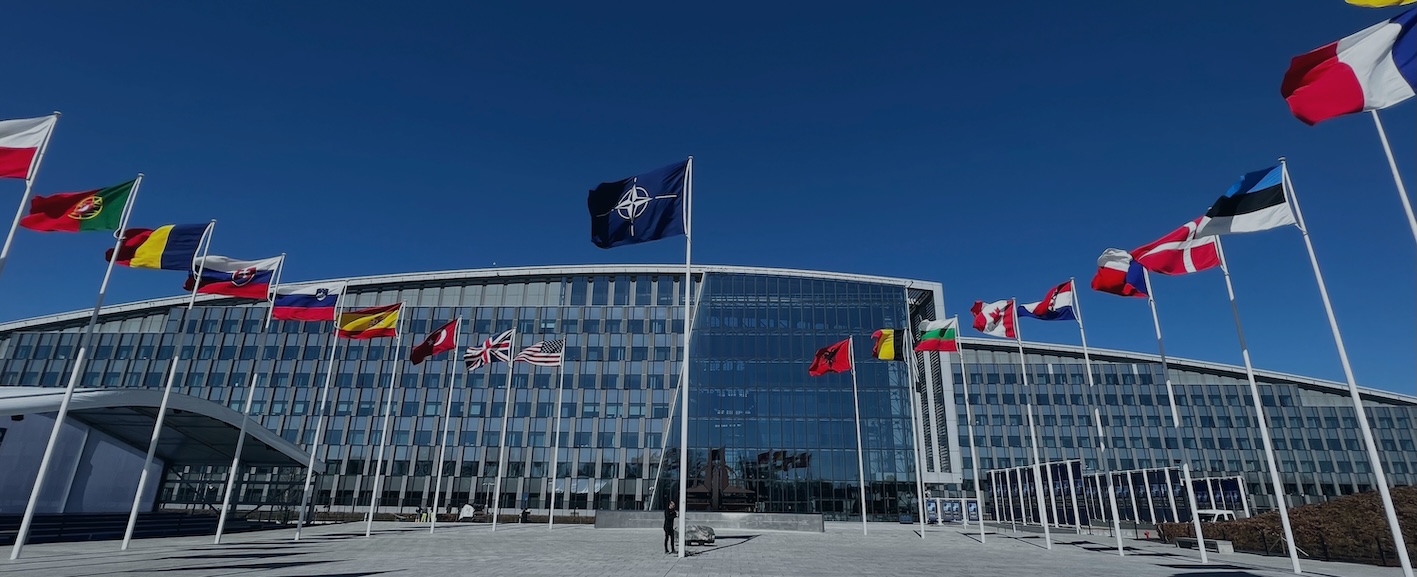Travel Risk Advisory
Evacuations from High-Risk Locations Call +44 (0)1202 308810 or Contact Us →
Travel Advice and Risk Mitigation Measures for the NATO Summit
Executive Summary
- The NATO Summit will take place in The Hague on 25–26 June 2025, attracting around 8,500 attendees, including heads of state, ministers, and international delegates.
- Heightened security and large-scale deployments will significantly affect daily life across the Randstad region from 22 to 27 June.
- Extensive airspace restrictions and runway closures at Schiphol Airport will disrupt commercial flights, with up to 30% reduction in capacity.
- Road closures on key routes around The Hague, Amsterdam, and Rotterdam will lead to severe congestion and travel delays.
- Demonstrations and counter-events are expected, with an increased risk of disruption near designated protest zones.
- There is an elevated cyber threat environment, with risks including disinformation, surveillance, and network intrusions.
- The Netherlands remains at a “substantial” terrorism threat level; lone actor attacks are more likely than coordinated group actions.
- Business and government travellers should adopt robust security measures and avoid affected areas unless operationally required. Learn more about Executive Protection and Secure Journey Management.

SITUATION SUMMARY
What to Expect for NATO Summit in The Hague
On 25 and 26 June 2025, the annual NATO Summit is set to take place in The Hague, Netherlands, for the first time since the founding of NATO in 1949. The event is set to host approximately 8,500 visitors, consisting of approximately 45 heads of state, 45 foreign ministers, 45 defence ministers, 6,000 delegates, 2,000 journalists, and 800 guests.
The summit is occurring within the context of the Trump administration consistently distancing itself from NATO, major developments in the war in Ukraine, and European NATO leaders increasingly discussing the necessity for capable European defence and deterrence against Russia that is independent from US support. While an official agenda has not been published, the summit will almost certainly address defence funding and membership status for its member states, in addition to boosting NATO defence capabilities.
The summit will almost certainly trigger significant travel disruptions and heightened security threats in the Randstad area from 22 to 27 June.
How will security be managed during the NATO Summit in The Hague?
Numerous security measures will be implemented during the summit. 27,000 police officers, approximately half of the Dutch National Police force, are set to be deployed across the two days, supported by 5,000 armed forces personnel and special forces teams on 24-hour standby.
Patriot air defence systems and counter-drone installations will reportedly be used to defend the summit from aerial threats. F-35 fighter jets and Apache patrols will also occur over the city and along the coast. An air exclusion zone will operate over a 22-kilometre stretch of coast between the Hook of Holland and Noordwyk.
Security will be prioritised at the World Forum (where the summit will be taking place), Huis ten Bosch (where the leaders will dine), and the Grand Hotel Huis ter Duin (where President Donald Trump will likely reside).
TRAVEL RISKS
Will flights and public transport be affected during the NATO Summit?
Significant travel disruptions should be expected during the week of the NATO Summit. The World Forum is approximately 30 minutes from two of the Netherlands’ largest airports, Amsterdam Schiphol Airport (AMS) and Rotterdam The Hague Airport (RTM).
Significant airport disruptions are almost certain, particularly at Schiphol, where the Polderbaan Runway will be closed to air traffic between 21 and 27 June. With the Buitenveldertbaan Runway currently under maintenance, commercial air traffic will be reduced by between 25 and 30 per cent during this period, with an estimated 100,000 passengers likely to face cancellations or rescheduling. This may increase traffic at The Hague airport as flights reroute.
Transport disruptions will also affect road travel. Authorities are set to close roads to transport world leaders on the A4, A5, A44, N44, and N440 from 22 to 27 June, which will almost certainly disrupt travel between Amsterdam, The Hague, and Rotterdam. The N434 will also be closed in the afternoon and evening of 25 June. Local and regional roads around the Hague, Wassenaar, Katwijk, Noordwijk, Haarlemmermeer, Leiden, and Rotterdam will also be closed, making several areas difficult to reach. Large-scale diversion routes have been set up.
The most congested periods will highly likely be late 23 June, early 24 June, and late 25 June. Triple the normal traffic volumes are to be expected at least 450 kilometres around the periphery of the World Forum. In anticipation of major traffic disruptions, the Dutch government have warned people to avoid the central Randstad region between 23 and 26 June, advising residents to work from home as much as possible and to use public transport if travel is necessary. Public transport will likely be overcrowded as people avoid driving disruptions and follow government advice, likely leading to an increase in petty crime.
Are protests expected during the NATO Summit in the Netherlands?
There will almost certainly be civil unrest in the days around the event. An international protest has already been organised for 22 June at Koekamp near the Hague Central Station by the Dutch Counter Summit Coalition for Peace and Justice. A “Counter Summit” conference has been scheduled for 21 to 22 June, which may draw additional protesters to The Hague.
Authorities have designated specific areas for demonstrations, with small-scale protests allowed around the World Forum, and larger-scale protests limited to the Malieveld. While the demonstrations will likely be peaceful, the high levels of security during the summit raise the possibility of clashes between protesters and security forces.
What cyber risks and espionage threats are linked to the NATO Summit?
There will likely be a heightened risk of cyberattacks and espionage, perpetrated mostly by Russia. Typical hybrid threats from Russia, in its campaign to gain a competitive advantage over its Western adversaries, include disinformation campaigns, sabotage, and cyberattacks.
Disinformation, particularly on social media platforms like X, will likely be used to sow confusion and undermine confidence in authorities; fake security, transportation, or health and safety alerts online are a potential method. Espionage could additionally target business travellers as hostile actors attempt to access confidential and proprietary information. Public Wi-Fi networks are a likely target, with perpetrators aiming to steal personal data or credentials.
Cyberattacks and sabotage targeting essential services such as transport infrastructure pose another threat, with perpetrators incentivised to cause disruptions to reduce the summit’s credibility.
Is there a terrorism threat during the NATO Summit 2025?
There is an increased threat of terrorism, resulting from the high visibility of the event. Before the event was announced, the Netherlands’ National Coordinator for Security and Counterterrorism (NCTV) placed the country at a threat level four, indicating a “substantial” risk of terrorist attack.
A recent attack took place on 27 March 2025, where a mass stabbing occurred near Dam Square, injuring five individuals. The perpetrator was a Ukrainian citizen from Donetsk; the motive is still unclear, but he has been charged with attempted murder with terrorist intent.
While the high levels of security likely lower the risk of coordinated attacks by violent extremist organisations (VEOs), lone actor attacks are more difficult to mitigate against and predict for intelligence agencies. Lone actors typically use unsophisticated opportunistic methods, including vehicle ramming, knife attacks, and arson.
MITIGATION
Travel Advice and Risk Mitigation Measures for the NATO Summit in The Hague
- Plan for significant travel disruptions. Check with your airline to confirm if your flight is still operating as scheduled.
- Adhere to instructions issued by authorities. Carry valid identification at all times.
- Unless specifically travelling to the event, avoid travelling near the World Forum, Huis ten Bosch, or Grand Hotel Huis ter Duin.
- Avoid the Diplomatic Zone around the Peace Palace, International Court of Justice, and embassies, which may be heavily restricted.
- Avoid areas where demonstrations are taking place.
- Avoid overt displays of wealth and be mindful of pickpockets, particularly in large crowds and on public transportation.
- Stay up to date with local news outlets. The Municipality of The Hague (Gemeente Den Haag) website typically publishes advisories regarding road closures and security perimeters.
- Business travellers in sensitive industries should assume that they are being targeted by espionage and implement the appropriate security protocols and countermeasures. These include avoiding public Wi-Fi networks; using multi-factor authentication, VPNs and loaner devices; and establishing clear red lines for what information they are willing to share and bring in-country. Learn more →

Request an Executive Protection Quote
Contact us to discuss secure transportation during Nato Summit 2025
